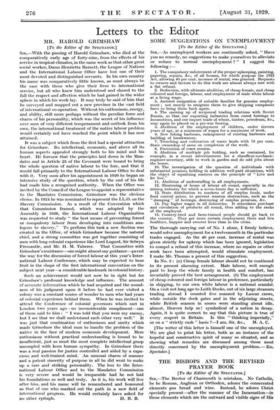Letters to the Editor
MR. HAROLD GRIMSHAW [To the Editor of the SPECTATOR.] SIR,—With the passing of Harold Grimshaw, who died at the comparatively early age of forty-nine, from the effects of his service in tropical climates, in the same week as that other great social worker, Dame Henrietta Barnett, the League of Nations and the International Labour Office have lost one of their most devoted and distinguished servants. In his own country his name was comparatively little known, as must always be the case with those who give their lives to international service, but all who knew him understood and shared to the full the respect and affection which he had gained in the wider sphere in which his work lay. It may truly be said of him that he surveyed and mapped out a new province in the vast field of international co-operation. Without his enthusiasm, energy, and ability, still more perhaps without the peculiar force and charm of his personality, which was the secret of his influence over men of very different temperament and outlook from his own, the international treatment of the native labour problem would certainly not have reached the point which it has now attained.
It was a subject which from the first had a special attraction for Grimshaw. Its intellectual, economic, and above all its human aspects appealed strongly both to his mind and his heart. He foresaw that the principles laid down in the Man- dates and in Article 23 of the Covenant were bound to bring the whole question of native labour to the fore, and that it would fall primarily to the International Labour Office to deal with it. Very soon after his appointment in 1920 he began an intensive study of the question, which by the end of his life had made him a recognized authority. When the Office was invited by the Council of the League to appoint a representative to the Mandates Commission, Grimshaw was the obvious choice. In 1924 he was nominated to represent the I.L.O. on the Slavery Commission. As a result of the Convention which that Commission framed, which was adopted by the Assembly in 1926, the International Labour Organization was requested to study" the best means of preventing forced or compulsory labour from developing into conditions ana- logous to slavery." To perform this task a new Section was created in the Office, of which Grimshaw became the natural chief, and a strong committee was got together consisting of men with long colonial experience like Lord Lugard, Sir Selwyn Fremantle, and Mr. H. M. Taberer. That Committee with Grimshaw's assistance—one might almost say guidance—paved the way for the discussion of forced labour at this year's Inter- national Labour Conference, which may be expected to bear fruit in the shape of the first international convention on the subject next year—a considerable landmark in colonial history.
Such an achievement would not now be in sight but for Grimshaw's profound knowledge and influence. The amount of accurate information which he had acquired and the sound- ness of his judgment upon it before he had ever visited a colony was a constant source of wonder to men who had years of colonial experience behind them. When he was invited to attend the Conference of colonial governors which met in London two years ago—no inconsiderable compliment—one of them said to him : " I was told that you were my enemy, but I see that we shall understand each other very well." It was just that combination of enthusiasm and sanity which made Grimshaw the ideal man to handle the problem of the native in the face of modern economic development. Mere enthusiasm without practical understanding is bound to be insufficient, just as must the most complete intellectual grasp uncoupled with keen human sympathy. In Grimshaw there was a real passion for justice controlled and aided by a capa- cious and well-trained mind. An unusual charm of manner and a patent sincerity of purpose in all he did went to make up a rare and striking personality. The loss to the Inter- national Labour Office and to the Mandates Commission is very severe and would be irreparable had he not laid his foundations so well and truly. As it is, his work will live after him, and his name will be remembered and honoured as that of one who marked out the path in a new field of international progress. He would certainly have asked for
































 Previous page
Previous page